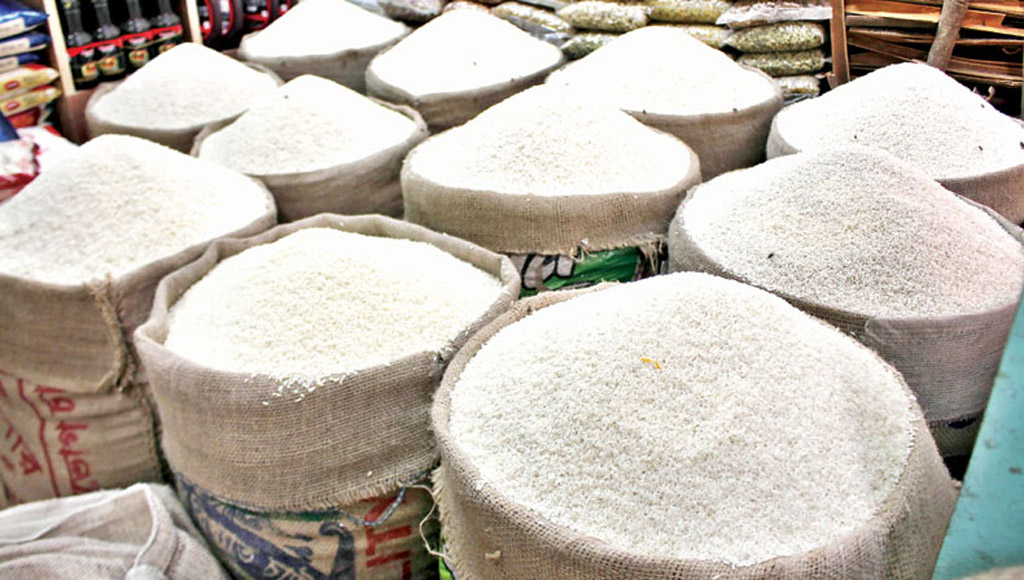Tags
Rice price sees sharp rise despite aman harvest
Moinul Haque

The prices of rice continued to rise on the local market in the past two weeks during the harvest of aman, which contributes 40 per cent of the country’s yearly demand for the staple food.
Traders said that the prices of rice witnessed a sharp rise in the past 15 days mainly due to the paddy price hike as production of aman decreased in some parts of the country due to flood and heavy rain.
Economists and market analysts, however, blamed lack of government monitoring, syndicate of traders and penetration of corporate companies in the rice trade for the rice price hike.
They also said that rice mill owners and wholesale traders were fully aware of the declining government buffer stock and were exploiting the situation to their advantage.
The prices of all varieties of rice increased by Tk 5–10 a kilogram on both the wholesale and retail markets.
The medium-quality rice sold for Tk 62–70 a kilogram on retail markets in the city on Monday while it sold for Tk 56–62 two weeks ago.
Similarly, the price of fine variety of Miniket increased to Tk 80–85 a kilogram from Tk 76–80 a kilogram and the price of Najirshail increased to Tk 90–100 a kilogram from Tk 85–90 a kilogram.
‘We have observed a sharp increase in rice prices at the mill gate over the past two weeks, with rice mill owners attributing it to a rise in paddy prices,’ Mohammadpur Krishi Market Paikari Chal Babosayee Samiti general secretary Syed Monirul Islam Montu told New Age on Monday.
He said that the wholesale prices of miniket rice increased to Tk 76–77 a kilogram from Tk 65–70 a kilogram while the prices of Najirshail increased to Tk 90–95 a kilogram from Tk 80–85 a kilogram.
‘We do not know the actual reason behind the price hike of rice, the government should investigate to uncover and address the underlying causes,’ Monirul said.
Former Jahangirnagar University vice-chancellor and economist Abdul Bayes said that the government should take firm measures to rein in the market chaos as 40–50 per cent of the budget for the poor goes to rice.
He said that a syndicate operates within the rice market and is fully aware of the government’s declining rice stock.
The government should take the initiative to bolster its rice stock through imports, sending a clear signal to the syndicate that market manipulation would not be tolerated, Abdul Bayes said.
After the aman harvest is completed, it will become clear whether there is an actual rice shortage or if market manipulation is at play, the economist said.
While a stock of 11 lakh tonnes of rice is considered the standard for the government, the food ministry data shows that the current reserve stands at 7.5 lakh tonnes.
Food secretary Md Masudul Hasan said that the government stock of rice was increasing as the import of the item by both the government and private sector was going on.
He said that to increase the buffer stock of rice and curb the price in the local market, the government withdrew import duty on rice in November.
After lifting duties, import of rice increased, the secretary said.
Masud also said that there were individuals who exploit opportunities to make excessive profits round the year and the government was taking steps to curb such unfair business practices.
Department of Agricultural Extension additional director for crops wing Md Showkat Osman said that 91.4 per cent of the aman harvest was completed, with production of rice reaching 16 million tonnes.
Once the harvest is fully completed, the rice production is expected to reach 1.75 crore tonnes, which is 3 lakh tonnes below the government’s target of 1.78 crore tonnes as production decreased and was damaged in some areas due to flood, he said.
Consumers Association of Bangladesh vice-president S M Nazer Hossain blamed the lack of government monitoring and the syndicate of rice mill owners for the rising rice prices.
He also pointed to the involvement of corporate groups in the rice market.
The corporate groups purchase large quantities of paddy and stockpile the staple to secure excessive profits, he said.
https://www.newagebd.net/post/commodities/253578/rice-price-sees-sharp-rise-despite-aman-harvestPublished Date: December 24, 2024






